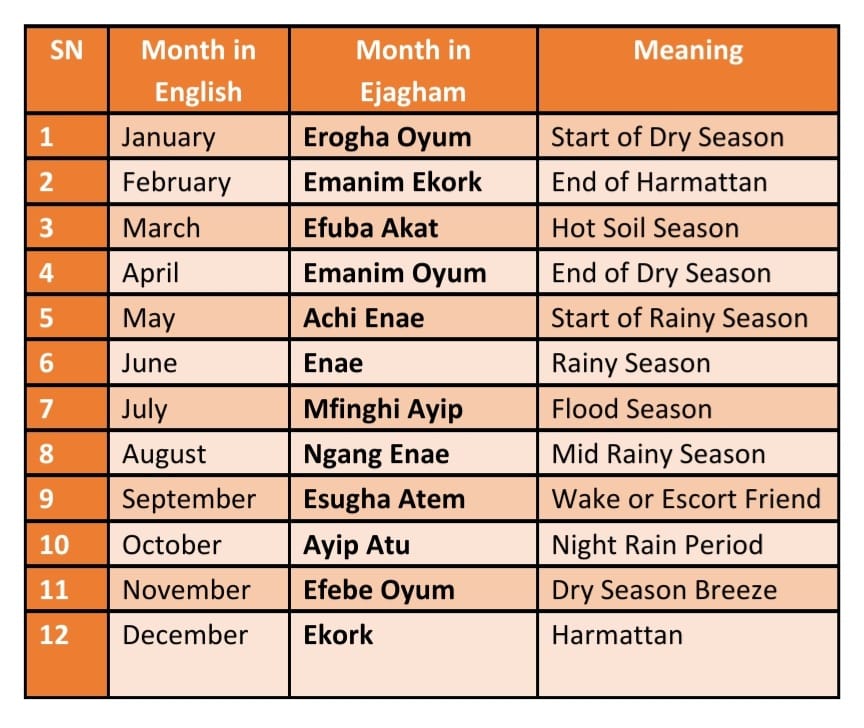EJAGHAM CALENDAR – EjT DIMENSION
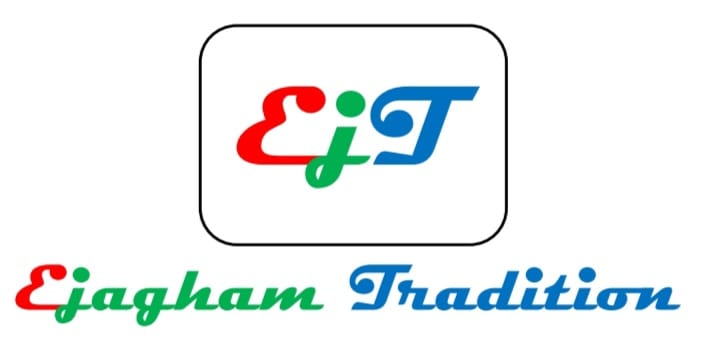
Basis of Calendar: Ejagham Recreational Game
NAME OF GAME: OBAE MBUB NKAG
Mrs. Bridget Nkor, from Ejagham Etung, submitted a version of months of the year in Ejagham to EjT. This was adopted by EjT as Ejagham months of the year. Obviously, attention then turned to Ejagham days of the week.

Mrs. Bridget Nkor
A reputable EjT member and a longstanding research partner to Dr. John Watters of the Summer Institute of Linguistics (SIL), Rev. Ayamba Nkiri, was asked how days of the week are named in Ejagham. His response was woven in an interesting narrative, as recounted below.

Rev. Ayamba Nkiri
During their research, Rev. Nkiri visited an Ejagham community in Ejagham Cameroon. He met with the Ntufam (Chief) of the community and sort to know how they named the days of the week in their Ejagham dialect.
Of course, it is common knowledge that the popular days of the week (Sunday – Monday), are not original to Ejagham. However, any heritage that was involved in any form of trade, farming and self-governance, would have developed ways of distinguishing one day from another. Self-governance is age-old to Ejagham as administered by the Mgbe institution. So Ejagham people must have developed a system of naming days of the week from Mgbe perspective.
Surprisingly, the nomenclature discovered by Rev. Nkiri is one that was associated with a typical Ejagham game; one that Gen Z would be amazed by, while the grown-ups would remember fondly. The game is called OBAE MBUB NKAG – simply called OBAE or NKAG.
So when Rev. Nkiri asked the question, the Ntufam of the community decided to demonstrate the answer rather than just explain. The Ntufam invited one of his daughters to fetch the materials used to play OBAE and played it to demonstrate how days of the week were named. Surely, by now the grown-ups would have guessed where this is heading. In this Ejagham community, the system of naming for weekdays adopted the principles of the OBAE game.
Keep in mind that the Western-style days of the week, as we know it, starts on Sunday through to Saturday – where Sunday is the day of rest as determined by Christianity.
OBAE can be played by an individual whereupon the proficiency of the individual is developed while having fun. It can also be played competitively by two or more players. This game is typically played by girls but boys can also take part in the game. When played competitively, the objective is to eliminate contestants until a champion emerges.
OBAE game primarily consists of 7 kernels (or equivalent) and it is usually played on the floor in the house or on the ground when played outdoors. The posture associated with this game is one that the players would sit on the floor/ground, legs outstretched and crossed, one over the other. The upper body is then turned about 45 to 90 degrees to the right such that the person faces the spot where the game is to be played. This posture is important because it facilitates the accommodation of many players. How so, you may ask?
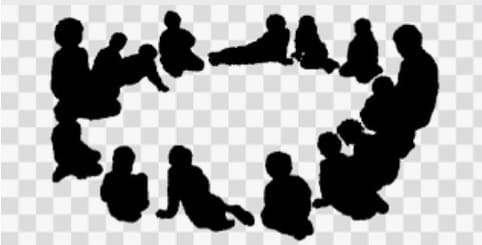
The described posture is the ideal position even for a single player. With two players, they would position themselves opposite each other. However, the game is usually played by 3 to 5 people for maximum fun, where players are eliminated till a winner emerges. This is where the posture makes sense. When more than 2 players are involved, the posture allows the formation of a circle. With the described posture, the feet of one player ends up around the back of the other player. This formation produces a circle where the area within the circle becomes the game area. This way, all participants can keep a close watch to ensure that the rules of the game are followed.
It is important to note that this posture is not unique to this game, it is a common posture Ejagham women take in group activities that involve seating on the floor. You would commonly see this in the mourning house (nju ekwu) when women sit in a group. In those days, when a group of women were eating, usually “Orang na Isu” – fufu and soup, the women take the described posture and form a circle. The bowl of isu (soup) would be in the middle from where each woman will approach it with her rolled up “ntu-orang” (ball of fufu).
THE GAME
At the start of the game, all 7 kernels are cupped in one palm and skilfully thrown to the floor or the defined game area. Skilfully because depending on the round of the game, how it is thrown to the floor matters as to how successful the player would be.
The next stage is to pick one of the 7 kernels, throw it up in the air to a height that will allow the player enough time to quickly pick up one of the 6 kernels on the floor and with it, catch the airborne kernel that by now gravity would have sent it on its way down. Success is in ensuring that the airborne kernel is caught before it lands back on the floor. If that happens then the player loses that round. The same routine would be repeated until all 6 kernels are successfully picked up one after another. This is Round 1, the round of 1 kernel at a time. Following the same principle, the other rounds are completed. There are six rounds altogether as shown on the table below.
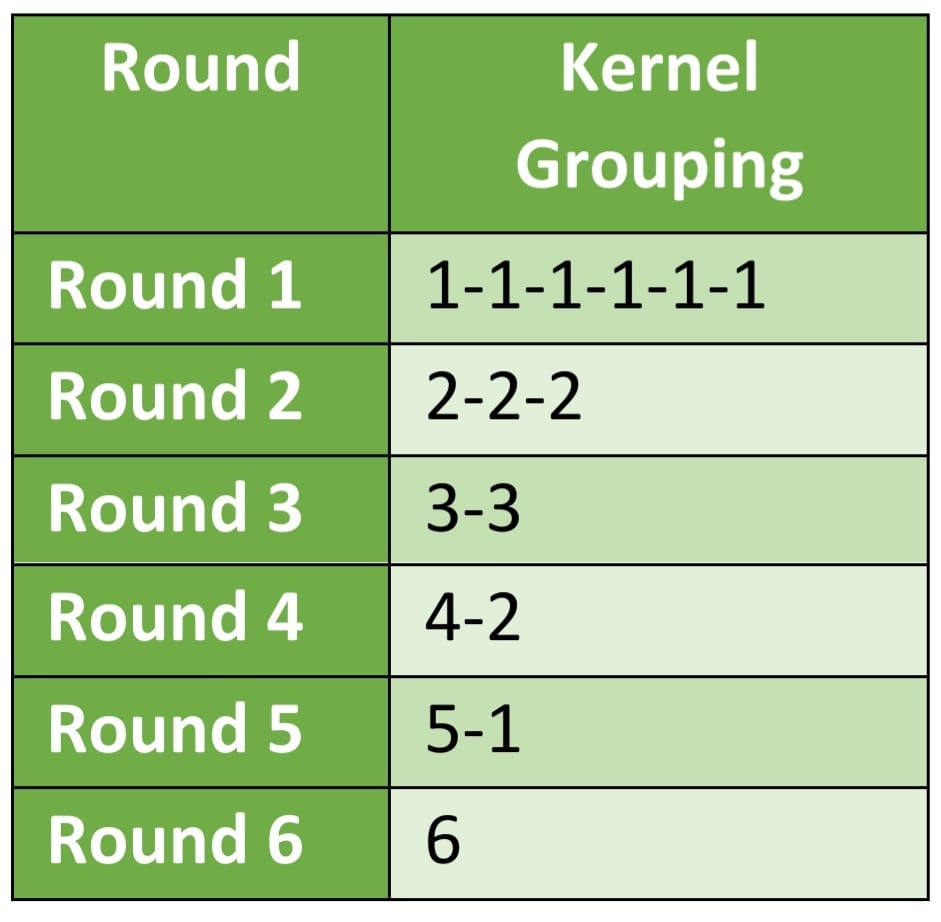
Noteworthy is the fact that each round is associated with its own unique name. The names are mainly derivatives of how Ejagham people count 1, 2, 3 …. However, the names are deliberately funkyfied as part of the game parlance.
Like any other authentic game system, OBAE has its own parlance as apparent in the names associated with each round of the game. The game is also associated with its unique song. The song, in particular, creates the required atmosphere and spirit of the game.
THE NAMES OF EACH ROUND OF THE GAME
“Yeb or yib” means uproot or start in Ejagham. So “eyeb ejen” means we have started the journey. As a derivative of “yeb”, “Yebhe” means open. Oyebha is the jargon for opening or starting round 1 of the game which mean the opener.
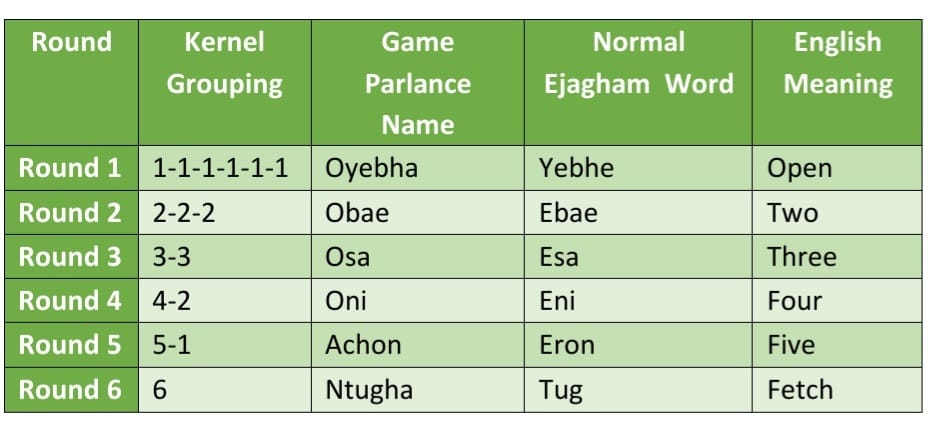
The names of Rounds 2, 3, 4 and 5 are simply 2, 3, 4 and 5. Round 6 is unique.
“Tug” means fetch in Ejagham; “Ntug” means I have fetched and “Ntugha” means the person who fetches. Note that in the 6th round of the game the player fetches all 6 kernels at once hence the name Ntugha.
So the daughter of the Ntufam showed her skills of the game as Ntufam simultaneously explained to Rev. Nkiri their nomenclature of days of the week. According to the Ntufam, the names of Rounds 1-6 represented Monday to Saturday of the western style week in that Ejagham community.
So what happened to the seventh day you may ask? According to Ejagham culture, the equivalence of Sunday is the day when food is offered to the gods, an Ejagham traditional practice called “Efin”. On the day Efin is observed, people do not go to farms on this day. They stay at home to perform Efin. Implicitly, this word is used to describe anyone that stays home while others go to work on a normal working day: nsig-efin. In fact, if you stayed at home and did nothing productive all day, you could say eyeh (today) nsig-efin. In this context, the comment generally comes with a sense of guilt for having wasted your day.
Similarly, and as an Ejagham traditional practice, when a particular Ekan (age-grade) stayed back to secure the community from attack while other Nkan (age grades) went to their farms, that activity is termed Efin-ekan. To all intents and purposes, therefore, the seventh day of the week, Sunday, was accepted to be Efin by the aforementioned Community in Ejagham Cameroon.
WEEKDAYS IN ENGLISH AND EJAGHAM
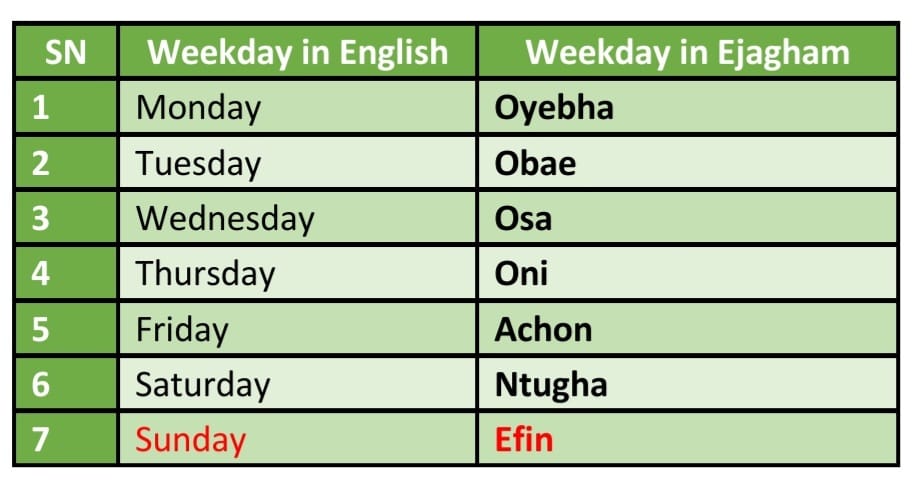
Conclusively, because this game is played across Ejagham, its simplicity, the storyline, and the fact that it fondly counts up to six, representing the six days of the week except Sunday, the game is considered (by EjT) perfect for naming the days of the week.
CALENDAR MONTH IN ENGLISH AND EJAGHAM
